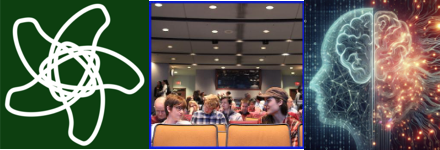Changing the Culture 2024
Details
The annual Changing the Culture Conference, organized and sponsored by the Pacific Institute for the Mathematical Sciences, brings together mathematicians, mathematics educators and school teachers from all levels to work together towards narrowing the gap between mathematicians and teachers of mathematics, and between those who do and enjoy mathematics and those who think they don't.

Date: Friday, May 17, 2024
Location: SFU-Vancouver at Harbour Centre, 515 W. Hastings Street, Vancouver, Canada
As in past years, registration for this event is free, but we ask you to complete the registration using the button on this page. Please register by Tuesday May 14th.
Conference Program
8:00 Registration, (1301 Harbour Centre Concourse)
8:45 Opening Remarks, (Room 1900 - Fletcher Challenge Theatre)
9:00 Plenary Talk I: Putting Infinite Pickles on the menu, Gordon Hamilton, Calgary (Room 1900 - Fletcher Challenge Theater)
Infinite Pickles are puzzles whose size can be dialled up or down. Each puzzle is really a whole family of puzzles of different sizes. The smallest members of that family can be solved quite easily, but dial up the size, and things get more challenging.
We will playfully explore some infinite pickles together. All of them work well in the elementary school classroom, but that doesn't mean they are easy to solve!
There will be lots of communal puzzling, laughter and pedagogy.
10:00 Coffee Break, (1400 Segal Centre)
10:30 Workshops A and B
- Workshop A: How do you slice up an Infinite Pickle?, Gordon Hamilton, www.mathpickle.com
Previously, we played with some well-tested elementary school Infinite Pickles. These puzzles can be dialled up or down in size to create challenges for the full spectrum of student abilities. Now, we try some new Infinite Pickles that have been in the classroom a couple of times at most. If there is a brand new Infinite Pickle, we'll play with it, come up with a fun theme, and then name it. Again, there will be lots of communal puzzling, laughter and pedagogy. - Workshop B: A Snapshot of Grading in Mathematics: Grade 8 to Post-secondary, Phil Stringer, Crofton House School
Grading practices have evolved significantly over the years, impacting both high school education and university-level courses. In this workshop, we explore changes stemming from the BC Ministry of Education’s Reporting Order, including proficiency scales, late submission policies, and other mandates. Additionally, we delve into how universities within the Pacific Institute for the Mathematical Sciences (PIMS) framework assess first-year calculus classes. Join us to gain insights into grading across educational levels and discuss strengths and threats in the system.
12:00 PIMS Award Ceremony: Presentation of the 2024 PIMS Education Prize Trefor Bazett, University of Victoria (Room 1900, Fletcher Challenge Theatre)
12:15 Lunch (Room 1400, Segal Centre)
13:00 Plenary Talk II: Artificial Intelligence and Mathematics, Ozgür Yilmaz, UBC (Room 1900 - Fletcher Challenge Theater)
In this talk, we explore the exciting ways artificial intelligence (AI) is interacting with mathematics, impacting teaching, research, and applications. The presentation is structured into three main components:
Mathematics of AI: We begin by reviewing the mathematical foundations that drive AI, particularly deep neural networks (DNNs). This includes the basic mathematical components of these networks, such as activation functions, weight optimization, and the calculus involved in training algorithms. Our goal is to highlight the mathematical structure of DNNs and illustrate how mathematics allows DNNs to learn from data.
AI in Math Research: We then examine how AI is revolutionizing mathematical research. AI aids in automating complex calculations and in exploring new mathematical theories, thereby expanding the traditional boundaries of the field and facilitating innovative breakthroughs. We will also see how AI can be used in solving “inverse problems” that are fundamental in medical imaging, signal and image denoising, and inpainting to count a few application areas.
AI in Math Education: Finally, we discuss how AI tools are transforming math education. We highlight how these technologies enhance instructional methods and foster personalized learning, transforming how students interact with mathematical concepts and how educators approach teaching.
14:00 Panel Discussion: How AI may influence assessment in a math class (Room 1900, Fletcher Challenge Theatre)
- Susan Oesterle (Douglas College)
- Phil Stringer (Crofton House)
- Trefor Bazett (University of Victoria)
- Bryon Carpenter (Abbotsford Virtual School and the Ministry of Education AI task force) [slides/PDF]
15:30 Concluding Remarks